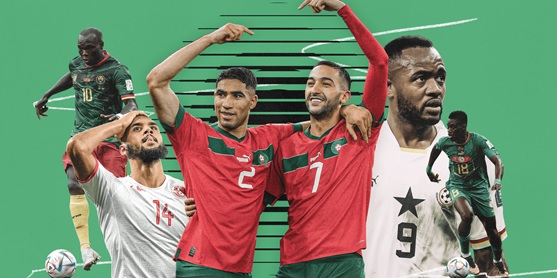It’s become something of a cliche to mention how African nations bring the liveliest supporters to a World Cup. At times, it feels like the subtext is that the African teams haven’t offered much on the pitch.
At this World Cup, those supporters have been more prominent than ever. If you were dumped in the middle of Doha with no prior warning and asked to guess the identity of the host nation solely by the supporters, you would — accepting that Argentinians and Brazilians will travel anywhere — guess somewhere in north Africa. Tunisians and Moroccans, many of whom live locally, have been particularly visible from the outset.

And happily, in front of huge numbers of their own supporters, African sides have done the business on the pitch too. Inevitably, the focus will be on Morocco, the first African side ever to reach the semi-final stage, but there has been success across the board. For the first time, all five African participants — Morocco, Tunisia, Cameroon, Ghana and Senegal — won a game. Granted, Tunisia and Cameroon’s sole successes came against weakened France and Brazil sides in their final group games. But this must be considered the most successful World Cup for African sides in terms of outright success and strength in depth.
The path to this point is worth outlining. African sides haven’t simply had to fight for success, they’ve had to fight for their participation at this tournament altogether. Egypt played a single game at the 1934 tournament, having qualified from the UEFA confederation. But incredibly, it wasn’t until 1970 that an African side next participated in the tournament.
The Confederation of African Football (CAF) was only formed in 1957 and there was initially no automatic World Cup entry for its sides. FIFA’s system of qualification for World Cup 1966 featured only one place for African, Asian and Oceanic countries combined. The African sides, boldly, boycotted qualification in protest at that (and FIFA’s support for South Africa). It worked. From 1970 onwards, Africa would have at least one guaranteed spot.
Still, progress was gradual. In 1970 Morocco finished bottom of their group, with no wins. Zaire in 1974 did the same, and the famous incident when Mwepu Ilunga booted away a Brazilian free kick did particular harm to Africa’s reputation on the world stage, with many assuming he simply didn’t understand the rules. The 1978 tournament brought Africa’s first World Cup win, through Tunisia’s 3-1 victory over Mexico, before its first appearance in the knockout stage in 1986, thanks to Morocco. Then came Cameroon’s famous run to the quarter-finals in 1990, a feat matched — but not surpassed — by memorable Senegal and Ghana sides in 2002 and 2010. Those achievements demonstrated African sides’ ability to compete. They also encouraged European clubs to chase the next generation of African talent.
A peculiar feature of Africa’s progress — or lack of it — has been circumstances conspiring against them in slightly bizarre ways. In 1982, Algeria were the victims of the ‘Disgrace of Gijon’, when West Germany and Austria played out a 1-0 German win that suited both European countries. FIFA immediately changed the rules, so the final group games were played simultaneously to prevent such straightforward collusion in future.
Read the full article: Why this World Cup is Africa’s most successful ever
Source: The Athletic


